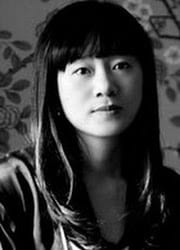MCLC Resource Center is pleased to announce publication of Linshan Jiang’s translation of and introduction to Anni Baobei’s “Qiyue and Ansheng.” You can read the full text at the following url: https://u.osu.edu/mclc/online-series/qiyue-and-ansheng/. A teaser appears below. My thanks to Linshan Jiang for sharing her work with the MCLC community.
Kirk A. Denton, MCLC
By Anni Baobei 安妮宝贝 (aka Qing Shan 庆山)
Translated by Linshan Jiang [*]
MCLC Resource Center Publication (Copyright December 2022)
Anni Baobei is the pen name of Li Jie 励婕, who was born in Ningbo in 1974. She started writing online in 1998 and worked as a writer for the online literary portal, rongshuxia.com (Under the Banyan Tree 榕树下), in 2000 (see Hockx 2015). In the same year, she published in print her first short story collection, Goodbye Vivian (告别薇安; 2000), which includes the story I translate here, “Qiyue and Ansheng.” The collection was an immediate commercial success. Since then, she has published dozens of writings, including novels, short story collections, essay collections, and photo collections. She has also worked as an editor of a literary journal, Open (大方), and a translator of picture books for children. In 2014, she changed her pen name to Qing Shan (庆山), reflecting a shift in her thinking and writing toward meditation and religious beliefs. Most of her works have traditional Chinese versions published in Taiwan. In 2007, Izumi Kyōka (泉京鹿) translated nine stories in the short story collection of Goodbye Vivian into Japanese. In 2012, Nicky Harman and Keiko Wong translated three of her short stories into English. Relative to her popularity in the Chinese-speaking world, Anni Baobei’s works have not been widely translated into foreign languages.
Anni Baobei’s “Qiyue and Ansheng” is a coming-of-age story of two girls from their days in junior high school to their adulthoods. Although it seems to be firmly in a heteronormative framework—both girls love the same boy—the story entails “the ambiguity of the homosocial and homosexual distinction in the female-centered relationship” (Wang 2021: 128). Additionally, as this story was published at the beginning of the new millennium when “cyber writing” emerged as a new literary phenomenon, the story shows the “urban fashion of the ‘petty bourgeois’ (xiaozi 小资) frenzy” as China embraced capitalism and globalization (Yang 2006: 121). In 2016, the story was adapted into a film entitled Soul Mate (七月与安生), directed by Derek Tsang (曾国祥) from Hong Kong, which brought renewed interest and expanding popularity to Anni Baobei and her writings. The two actresses in the film, Zhou Dongyu (周冬雨) and Ma Sichun (马思纯), who performed the two female protagonists in the story, won the Best Leading Actress category of the Golden Horse Awards, which made a history to have joint winners. The film was nominated for and awarded by various film festivals.
In this translation, I choose the revised edition published by Tianjin Renmin (天津人民) in 2020, which is different from the earliest edition published in 2000. Anni Baobei has a unique style that makes use of a variety of techniques and literary strategies, the most obvious of which might be her use of punctuation. The author seldom uses question marks; instead, she usually uses commas and periods to enclose a question. Using more commas and periods than question marks in the text, the story offers a sense of monologue for the whole text, and even a sense of certainty sometimes. For example, Ansheng asks Qiyue if she likes a simple life; Qiyue says yes. As readers, we have seen Qiyue express her wish to live a simple life from the beginning to the end, so only an terse confirmation is needed, rather than a long explanation. The story also lacks quotation marks, even though there are many instances of dialogue. It creates a sense of monologue and even of stream of consciousness. The way I deal with this is to render conversations in the present tense, and all other facets of the narrative, including characters’ mental activities and indirect dialogues, in the past tense. In this way, I try to maintain the style of the author, which can convey a sense of strangeness in the reading process. One dimension of its formal style that has changed is its use of periods. In the earliest version, the author used periods almost for every pause, creating a choppy, staccato feeling to the language. Although this is less true in the version I translate here, a sense of simplicity and restraint is still manifest. … [READ THE FULL TRANSLATION HERE]

